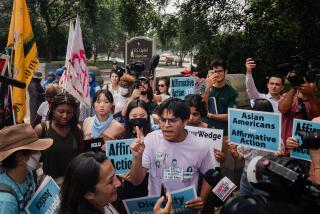Black Basketball Players Said to Graduate in Lower Numbers : Statistics: NCAA report says 29% finish their college education as compared to 55% for whites.
- Share via
Graduation rates of black male college basketball players are far below the norm, the NCAA reported Thursday in its first attempt to publicize academic records at its member schools.
The study, which did not include a school-by-school breakdown, showed that only 29% of black male basketball players who started school in 1983 and 1984 earned degrees, compared to 55% of white players. Black males playing basketball at Division I schools had a 23% graduation rate.
Overall, black male athletes had a 33% graduation rate, compared to 31% for the entire black student body. Black female athletes had a rate of 43%, compared to 34% for black females in general.
The survey involved students who entered college before the NCAA’s Proposition 48 eligibility requirement, which went into effect in 1985. Prop. 48 toughened entrance requirements, and as a result, graduation rates from 1985 are expected to be higher.
The NCAA also reported that athletes at major colleges graduate at about the same rate as all other students, which college athletic directors have been pointing out for several years.
Although NCAA officials tried to put a positive spin on the results, which were compiled last summer, the statistics on black males stood out.
The Chronicle of Higher Education reported in June that 60% of all scholarship holders in men’s basketball are black, but blacks constitute only 6% of all undergraduates at the same schools. The Chronicle found that more than one in seven blacks on Division I campuses were scholarship athletes.
The latest statistics have alarmed proponents of college athletics reform.
“Because of this (low graduation) rate, you’ll see Congressional intervention,” said George Raveling, USC basketball coach.
The pressure of such legislation prompted NCAA officials to reveal the graduation rates. Richard Schultz, executive director of the NCAA, said that the schools’ individual results will be revealed in two weeks.
Raveling said that the graduation rates in men’s basketball frustrate him, but they were not surprising, considering the NBA hardship rule that allows athletes to declare themselves available to the draft before they are seniors.
Using the NCAA formula to determine the percentages, only a few hardship cases will skew the results. Basketball teams usually have no more than three recruits in a given year. If one of three recruits turns pro before graduating, the graduation rates are dramatically altered.
“The better your (basketball) program, the worse your grad rates are going to be,” said Jack Citrin, faculty representative at the University of California.
Raveling, who will begin his 20th season as a men’s Division I coach next fall, said he had one player who was six hours short of graduating but left school for a professional opportunity.
“At no time am I saying this is right,” Raveling said. “I’m trying to offer a balanced perspective so we can intelligently deal with the problem.”
Female basketball players do not have the same professional opportunities, and thus, spend more time concentrating on academics, some experts said.
Murray Sperber, a professor at Indiana University who wrote the book, “College Sports, Inc.,” said, “There is still a tradition in women’s sport not to totally exploit the athlete.”
Sperber, an advocate of athletic reform, said coaches have been less than forthcoming about graduation rates. Sperber has studied Coach Bob Knight’s basketball program and determined that since 1980, three of 17 black recruits have graduated from Indiana, according to the NCAA’s standard. That is a far cry from the picture Knight paints when talking about his program. Knight has been lauded as one of the few major college coaches who graduates most of his athletes while having great teams.
Ronald C. Althouse, chairman of anthropology and sociology at West Virginia University, said many schools misrepresent their academic efforts.
Althouse, who wrote the book, “Racism in American Sport, the African-American Athlete’s Experience,” said years of institutionalization will temper any attempt for dramatic change.
Raveling said that his worst fear is that the publicizing of graduation rates will be the extent of any reform.
“Grad rates become no more than oral graffiti that mask what the real problem is,” he said.
Raveling is not sure how to correct the problem, but suggests that athletes need a new system to ensure a better education.
“We need to utilize the summer better,” he said. “Perhaps a year-round school.”
More to Read
Go beyond the scoreboard
Get the latest on L.A.'s teams in the daily Sports Report newsletter.
You may occasionally receive promotional content from the Los Angeles Times.










